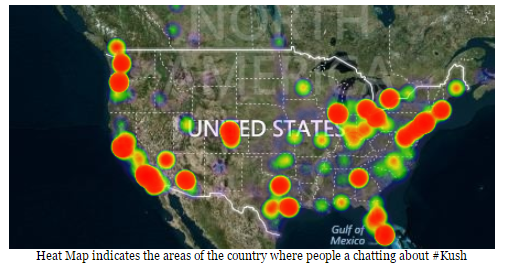While social media has done some great things, there is one that isn’t so great: selling drugs just got easier.A simple hashtag such as #hmu (hook me up), #kush, or any variation including a drug name can get some attention. Surprisingly, simply posting these kinds of messages are legal; it becomes an illegal act once a sale is made.
How can social media monitoring help? There are tools now that have enhanced the way law enforcement can monitor social activity – through geographical monitoring using simple geographical fences coupled with hashtags or keywords, police can easily identify where this type of activity is happening, which can assist in identifying and stopping illegal activity.
Using our social media monitoring platform, we did a quick search for people posting images and content with the hashtag #kush – another name for marijuana. The heatmap below shows where people are posting content, and the frequency at which these posts are occurring across the country:
This can easily drill down to a specific state, city, or street block to see where content is coming from. This is extremely useful for law enforcement, and is another tool they are adding to their arsenal to help fight crime.
While this example highlights the ease in which drug seekers and/or sellers can be identified, it can also be used in many other ways, including:
- Create a “fence” around a crime scene to identify possible witnesses that left the scene prior to police arriving.
- Monitor content to be proactive in identifying potential school violence.
- Identifying and monitoring gang activity, which can include location specific information
What once was seen as a tool for brands to connect with customers has morphed into an all encompassing tool. Law enforcement agencies are seeing the value of using social media monitoring, and specifically location based tools to assist in their efforts.
